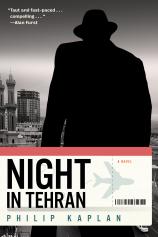Interview: October 27, 2021
Ambassador Philip Kaplan had a 27-year career as a diplomat in the U.S. Foreign Service, which included being U.S. minister, deputy chief of mission and Charge d’Affaires to the U.S. Embassy in Manila, Philippines, during the tumultuous overthrow of Ferdinand Marcos. His debut novel, NIGHT IN TEHRAN (which is now available in paperback), is a taut thriller about one American diplomat’s year of living dangerously in Tehran in the days leading up to the Iranian Revolution.
In this interview conducted by Michael Barson, Senior Publicity Executive at Melville House, Ambassador Kaplan talks about his decision to enter the diplomatic service, instances in his career when he had to convince foreign diplomats that certain U.S. proposals served a mutual interest, and the one novel that he considers to be a classic in the espionage thriller genre.
Question: What age were you when you decided to enter the diplomatic service? And who was the career diplomat whose accomplishments most influenced you to enter this profession?
Philip Kaplan: I began my career as a diplomat when I was 30, shortly after I met John Kenneth Emmerson. He was a professor at Stanford when I met him, and a distinguished diplomat who served during WWII in East Asia. And in the Kennedy administration, he was United States minister to Tokyo.
Ambassador Emmerson and his wife were gracious and hospitable people. They were role models to me and my wife. We remained in touch until he passed away in March 1984. The best piece of advice Ambassador Emmerson imparted to me was, “You will be told, ‘Don’t make waves.’ Ignore that advice; get in there and make things happen.” I took those words to heart and made them golden rules for David Weiseman. I like to think I am a soulmate of the fictional David Weiseman.
Q: Early in the book, your protagonist David Weiseman thinks to himself that diplomacy “isn’t just about process, or compromise. It was about persuading the other country that it was in their interest to do what YOU wanted them to do.” Can you point to an instance in your career where this was the precise situation you faced?
PK: It was never enough to impose America’s great power on countries when trying to change foreign diplomats’ minds. Instead, we sought to convince them --- in a more enduring manner --- as to why our proposals served a mutual interest. A deal we proposed in West Germany sticks out clearly in my mind. The U.S. proposed deployment of a politically sensitive weapon system to Germany. After I explained how the system would enhance German security, the top German general told me I could have a “Nein,” meaning no, or a “Yein,” meaning give him more time to work the issue. I took the “Yein,” and it led to the deployment.
Another example was during the Cold War with the then-Soviet Union. The United States was in a major arms control treaty negotiation with Soviet diplomats. The U.S. was suggesting that the Soviets take an asymmetrical arms reduction, meaning their force reductions would be larger than those of the United States. Gorbachev was newly in power, and the Soviet economy was doing poorly. I explained that a treaty based on equal end results, rather than actual equal reductions, would be fair and advance Gorbachev’s interests in building better relationships with Washington and Europe. And it worked! We were able to reach agreement.
Q: There is a long-established category of novels revolving around diplomatic espionage. Would you name one that you consider an all-time classic of the genre? And one published more recently that you feel nailed the challenges and perils presented by this century exactly right?
PK: In THE TEARS OF AUTUMN, former intelligence officer Charles McCarry explores the dilemmas our diplomats and CIA officers faced in Vietnam. Paul Christopher tells the Kennedy White House not to get in deeper, but he is overruled. Christopher’s station chief tells him, “They got into the White House and opened the safe, and the power they discovered took their breath away…. [T]hey think they can do anything they like, to anyone in the world, and there’ll be no consequences. But there always are.” Diem is ousted in a coup d’état and killed trying to escape. Three weeks later, President Kennedy is assassinated in Dallas, and some say this was Vietnam’s revenge.
Christopher, a man of principles, seeks to deal with the series of coups and flawed successors to Diem, leading ultimately to the humiliating escape of U.S. officials from the roof of the American embassy while Vietnamese citizens watch in desperation. The novel shows how even an exceptionally talented and courageous official could not override a White House decision yet persisted by seeking to salvage what remained of America’s options. The Vietnam War was a harbinger of Iraq and Afghanistan.
Q: What were your first thoughts after seeing the Oscar-winning movie Argo, which is set in 1979 against the same backdrop that your novel utilizes? Did the filmmakers commit any egregious errors involving the actual history that irritated you?
PK: Argo had the primary virtue of humanizing the hostage crisis in Iran, though it was quite dramatized by Hollywood. The Iran crisis was covered in a different context in NIGHT IN TEHRAN, which placed the hostage crisis in the framework of protagonist David Weiseman’s struggle to find an effective successor to the Shah of Iran. When the ayatollahs took over, the hostage crisis --- and over 40 years of authoritarian hostility --- followed in its wake.




